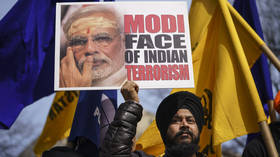New Delhi rejects report alleging it targeted Khalistan leaders with ‘assassination program’
The Indian foreign ministry dismissed the US-based outlet’s assertion as part of a “sustained disinformation campaign”
India’s Ministry of External Affairs on Sunday dismissed a report published by the US-based outlet The Intercept, which claimed New Delhi had earlier this year issued a “secret memo” to take “concrete measures” against the leaders of Khalistan separatist movement. In a strongly-worded statement, New Delhi called the report fake, insisting there was no such memo.
“Those who amplify such fake news do so only at the cost of their own credibility,” Ministry of External Affairs (MEA) spokesman Arindam Bagchi posted on X (formerly Twitter) in response to media queries.
The document, which The Intercept claims it has access to, was allegedly issued by the Indian foreign ministry in April this year and urged the diplomatic missions in North America to launch a “sophisticated crackdown scheme” against Sikh activists who support the Khalistan cause (the Punjabi Sikh separatist movement) and are located in the US and Canada.
The outlet’s report came amid allegations that India had masterminded the killing of Hardeep Singh Nijjar, a Canadian citizen and Khalistan activist, who was murdered in Canada in June, as well as an assassination attempt against US-based Khalistan leader Gurpatwant Singh Pannun which was foiled by the FBI.
Condemning the report as “part of a sustained disinformation campaign against India,” the foreign ministry alleged that the outlet in question is known for propagating fake narratives “peddled by Pakistani intelligence.”
Reacting to the Ministry statement, one of the authors of the report, Brooklyn-based Murtaza Hussain, said that “ironically” Pakistani authorities accuse The Intercept of being a “RAW intelligence front,” adding “So draw your own conclusions.”
The Intercept report claimed it had in its possession a memo, supposedly issued by the External Affairs Ministry in April, listing Sikh dissidents under investigation by India. Nijjar, who was gunned down by unknown assailants near Vancouver in June, was among those named in the supposed list. The leaked memo said the report did not “explicitly order the killing of Sikh activists,” but asked Indian diplomats in the US and Canada to cooperate with agencies including New Delhi’s intelligence division Research and Analysis Wing (RAW).
In September, Canadian Prime Minister Justin Trudeau linked Nijjar’s killing to “agents of the Indian government,” sparking a diplomatic row between New Delhi and Ottawa. India has repeatedly denied these allegations and sought evidence from Canada to back up these allegations. In the early days of the stand-off, Canada expelled India’s top RAW official. New Delhi, in a tit for tat move, deported a Canadian intelligence officer and later ordered more 42 diplomats to leave the country, citing the need for “parity” in diplomatic strength.
Earlier this month, Washington came out with allegations against India for its involvement in a foiled murder plot against a New York-based Sikh activist, Gurpatwant Singh Pannun, a polarizing figure who has been accused of repeatedly making threats against India. Pannun had founded Sikhs for Justice (SFJ), one of the largest groups advocating for the creation of the state of Khalistan. The organization was banned in India in 2019 as an “unlawful association.” Both Pannun and Nijjar were on India’s “terrorist” list.
Reacting to the US allegations, India’s Foreign Ministry said it was “contrary to Indian government policy” and a “matter of concern.” A high-level inquiry committee has been constituted to look into “all the relevant aspects of the matter,” a spokesperson for the ministry has said. The issue is expected to be taken up by Washington this week during FBI Director Christopher Wray’s anticipated visit to New Delhi.
You can share this story on social media:








Comments are closed.